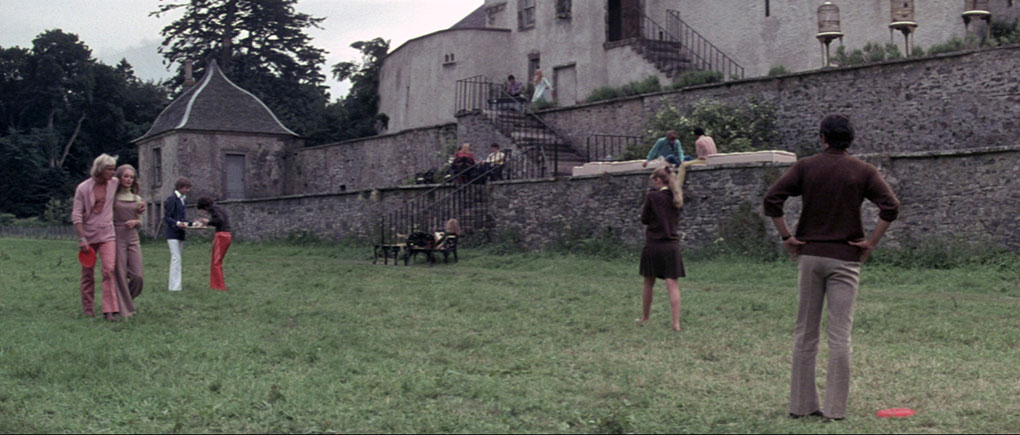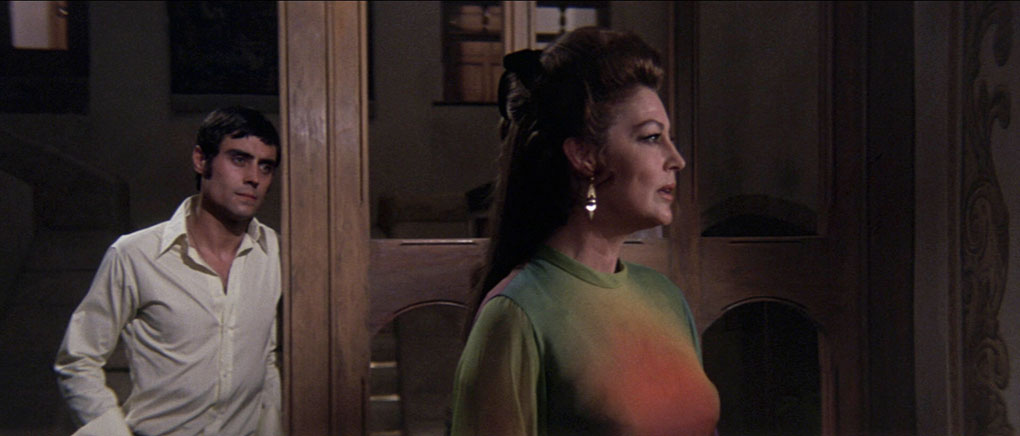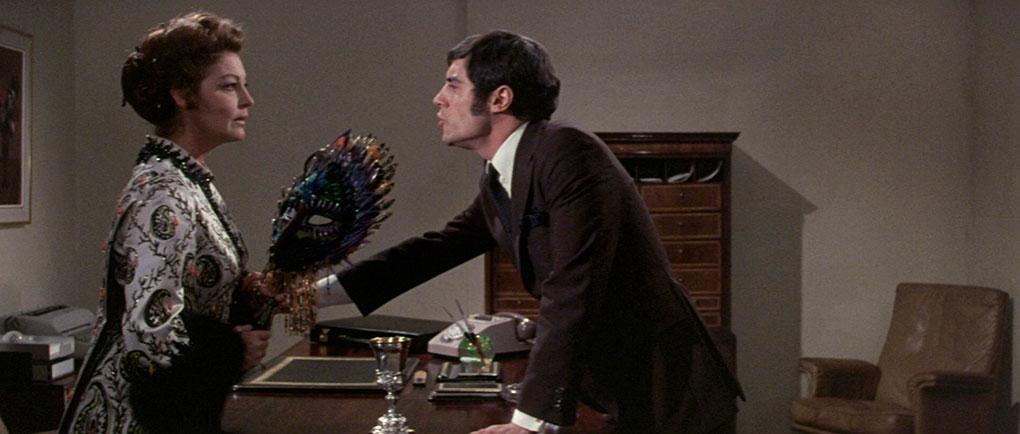|
Michaela Cazaret (Ava Gardner) is a very rich woman, living in a plush home near the Scottish boarders. Her latest conquest is Tom Lynn (Ian McShane) and also living there are a group of young men and women. However, Janet (Stephanie Beacham), a vicar's daughter, falls for Tom and he with her, inspiring Michaela's revenge.
The Ballad of Tam Lin is a curious film, made at a time in Hollywood where adventurousness could flourish, if briefly, in Hollywood – though it didn't mean that people would flock to the end product, and they didn't. (The film is also known as Tam Lin, The Devil's Widow, The Devil's Woman, Toys and Games, Games and Toys or simply just Toys and maybe other titles that somewhere at some point saw the light of a projection lamp, and these are just ones from English-speaking countries. For the variant titles including the words Tam Lin, Wikipedia inserts a hyphen which isn't on screen, at least not in the version on this release.) A film version of a well-known Scottish ballad, starring a star of Hollywood's golden age...it seemed an odd fit. But it was made in 1969, where films which might have been lavish sure-things were becoming hugely expensive duds. Meanwhile, a younger generation of filmmakers had begun to produce films a younger generation of cinemagoers had flocked to, and which elderly studio executives didn't really understand. So it wasn't unheard of that a film was financed in the hope that somehow, something should stick. In that sense, The Ballad of Tam Lin was no more out there than most, less so than other films coming out from US majors then. And it did have star names in the lead role and in the director's seat, though at forty Roddy McDowall just about qualified as a younger filmmaker. The film was, however, a flop, sitting on a shelf for a few years and being hard to see off and on, and turning out under several different edits and titles. It was the only film that Roddy McDowall directed. It remains obscure now, but is a definite curio which has a cult following. (His being busy with this film, incidentally, is the reason why Beneath the Planet of the Apes (1970) is the only one of that five-film series where McDowall didn't appear.)
The film, under whichever title, with a screenplay by William Spier, is based on the Scottish borders ballad, of which one of the earliest and most famous variations was that by Robert Burns in 1796, though the song is at least two and a half centuries older than that. The ballad has made many appearances since: as a song it became a standard amongst the British folk-rock community, with Fairport Convention and Steeleye Span and others all producing their own versions, as well as Pentangle's, which is on the film soundtrack itself. The story has been adapted to both short stories and novels (one of which being Alan Garner's Red Shift) and the present film version.

There are a long line of actors who became directors at some point in their careers. In some cases, film directing was a one-off, while others have turned it into a distinguished second career, particularly when acting roles are more difficult to come by. These include, for example, Robert Redford and Clint Eastwood. There are some one-offs like The Night of the Hunter, which make you wish Charles Laughton had been able to direct another film – but no, as the one he did direct was a huge box-office flop. The Ballad of Tam Lin isn't in that league – and some knowledge of the original ballad would certainly be helpful as the story isn't always the easiest to follow.
The Ballad of Tam Lin is a collection of striking moments and scenes which never really completely coheres. It survives as a fine vehicle for Ava Gardner. It was true then and is still true now that good roles for women tend to be in short supply after the age of thirty-five or forty or so, and there's no doubt that Gardner, forty-seven when she made this, was well aware of it. It's her film, gifted to her by lifelong friend McDowall, and she grabs it with both hands. McShane, by some definitions is the protagonist, so maybe that's another stumbling block – he doesn't do much in the way of protagging. Cyril Cusack and Richard Wattis are solid in support, and in Michaela's following are some notables near the start of their careers: Stephanie Beacham, Sinead Cusack, Madeline Smith, Jenny Hanley, Joanna Lumley and Bruce Robinson among them.
I suspect no one involved in the film – even at such an uncertain time in Hollywood, thought the film would ever be a huge success, but cult followings are better than nothing. A failure, then, though an often fascinating one.
The Ballad of Tam Lin is number 45 in the BFI Flipside line, a single Blu-ray encoded for Region B only.
The film has an interesting censorship history. It was first submitted to the British Board of Film Classification in March 1970 and was rated X (at the time, sixteen and over) with the removal of one word from Tom's line "I shall be in the fucking prime of my life" – an edit to the dialogue track only, as McShane is facing away from the camera when he speaks the word. However, in July of the same year, the AA certificate (fourteen and over) was brought in, with the X being raised to eighteen and over. The Ballad of Tam Lin was not the only film which was resubmitted with a view to reducing the certificate from the old X to the new AA (I Start Counting and If…. were others.) It's not recorded if this dialogue cut was restored or not, nor for another BBFC pass in 1977 under the US title of The Devil's Widow, under which title the film finally had a UK release. However, the F word is missing from the Olive Films DVD and Blu-ray releases in the UK* and is also AWOL from the present BFI Blu-ray, which is rated 15. From the extras, Red Red? Red is a 15. The two Border Country shorts are documentaries not requiring to be certified, but O'er Hill and Dale begins with the U certificate it carried on its original release.
The Ballad of Tam Lin was shot in 35mm with anamorphic lenses, and the Blu-ray is in the intended ratio of 2.35:1. The transfer is based on Paramount's HD master. Given that I hadn't seen the film before, the colours look fine though there are occasional speckles and spots, if nothing too distracting. Grain is natural and filmlike.
The sound is the original mono, rendered as LPCM 2.0. It's clear and well-balanced, if mixed a little low: I had to turn it up to hear some of the dialogue clearly, but fear not – the score and sound effects aren't deafening as a result.
English subtitles are available for the hard of hearing for the main feature but not the extras.
Commentary by Vic Pratt and William Fowler
This commentary track by BFI Flipside heads Pratt and Fowler is new to this release and is a packed talk, taking in folk horror, allowing time for Pentangle's contribution. Occasionally it's a little over-enthusiastic: more than once Fowler stops to praise Billy Williams for a particular shot, and you have to wonder how much is due to Williams as it was likely actually shot by the second unit. (Incidentally, Williams is one of the few principal cast or crew members still alive who isn't represented in the extras.) Well worth listening to.

Interview with Ian McShane (11:04)
The first three interviews on this disc were produced by Via Vision and have been carried forward from their Blu-ray release on the Imprint label in Australia. They are all audio-only, over clips from the film. McShane's audio isn't that great but is clear enough. He says that the film wasn't something he would turn down lightly – a lead role if one which required a low-key approach, almost like that of the straight man to the comic, particularly when dealing with a noticeably nervous leading lady.
Interview with Stephanie Beecham (10:00)
Stephanie Beacham is certain that she first attracted the intention of McDowall and producer Stanley Mann, attracting considerable attention while being oblivious to her attractiveness. Back then, Elizabeth Taylor had the lead role, but due to a bad back she had been replaced by Ava Gardner. She has a lot to say about Roddy McDowall. On the other hand, McShane was "a naughty boy", both on and offscreen. Beacham talks about Billy Williams's approach to cinematography, frequently shooting her through gauze with two holes burned into it for her eyes.
Interview with David Del Valle (11:45)
Also made for Via Vision/Imprint, this time the interviewee talks to camera. Del Valle is a film historian, and was also Roddy McDowall's biographer, so that's where he begins, having first seen the film in its US edit. So that's where he begins, with McDowall making the film as an act of devotion to his lead actress. He compares McDowall to other actors who only made one film as a director: most famously Charles Laughton but also Peter Lorre, and distances the film from the "hagsploitation" films many leading ladies ended up starring in.
Interview with Jacqui McShee (27:15)
One of the reasons for the film's cult following is Pentangle's contribution to the soundtrack. Pentangle were part of the British folk-rock movement of the time, along with Fairport Convention, The Incredible String Band, Steeleye Span and others. Jacqui McShee, then as now lead singer of Pentangle, now talks, in a piece produced by the BFI for this release, where she is interviewed sitting in one of the seats at the BFI Southbank in London. She talks about the foundation of the group and the recording of the songs for the film. This is more a career overview than specific to the film, but she does talk about "Tam Lin" the song, which they still perform live.
Interview with Madeline Smith (32:07)
Also new for this release, a career overview spoken to camera from a seat at the BFI Southbank. An only child, she discovered the well-known Sixties boutique Biba when she was a schoolgirl, and worked there once she left school. Offers for small film roles and modelling assignments followed, and eventually to The Ballad of Tam Lin. She talks a lot about the film production and the people she worked with. That includes the star, who she found very shy and quietly-spoken and ultimately a rather sad woman.
Interview with Hans Zimmer (19:30)
Unlike the other interviews in this set, this is audio-only but not accompanied by extracts from the film: instead, it plays as an alternate soundtrack to the main feature. Zimmer is here to talk about his mentor Stanley Myers, with whom he worked in his early career – at first, because Myers needed someone to play the synthesiser on his scores. Over time, Zimmer took on some compositional responsibilities: Myers hated car chases, so Zimmer gained plenty of experience in scoring them, vice versa with love scenes. This appears to be edited from something longer, and it ends abruply, with the feature audio taking over for the remainder of the soundtrack.

Interview with Roddy McDowall (17:33)
This was recorded by McDowall as an introduction to the 1988 VHS release of the film, and talks about the making of the film and his friendship with the leading lady. A close friend, but then McDowall seems to have been someone who knew everyone, and had been in Hollywood since he was a child.
Red Red? Red (33:49)
We move on to items which aren't directly concerned with the main feature, but are tangential to some of its themes. Red Red? Red is a short, non-narrative piece made for the BFI Production Board in 1971, with no dialogue, depicting a hippie commune in Devon, all to a music score by The Rebellious Meek. There are three credited directors: Jim Weiss, Chris Maudson and John Phillips. The production rented a country cottage and invited twenty of their friends down to make up the "cast". The result, some thirteen or so sequences, is largely improvised and has a ritualistic feel to it. Or that's half an hour of your time you won't get back: you choose.
Border Country shorts:
O'er Hill and Dale (16:00)
Queen o' the Border (9:42)
The Border Country heading takes us to a sub menu of two titles, though not with a Play All function. They both take us to the border country between England and Scotland...the real one rather than the fictional one, though both films clearly can't resist the olde-worlde spellings in their titles.
O'er Hill and Dale takes us back to 1932, a short film made for the Empire Marketing Board. Directed by Basil Charles Wright and produced by John Grierson, it follows farmer Mr Wright on his daily round, rescuing a lamb who had fallen into a (very cold) burn and couldn't get out again. There's no direct sound, only narration and music, a pleasant and well-put-together quarter-hour.
While O'er Hill and Dale is black and white, Queen o' the Border, from 1949, is in colour, the Technichrome process developed to film the London Olympics the year before. The film takes us to the town of Hawick, with much emphasis on the local craft of knitting. The score is by Malcolm Arnold. The result is a little more rough and ready than the earlier film, though it's watchable enough.
Theatrical trailer (2:10)
"There's a dark side to the glittering world of money and beauty, where every pleasure has its price." More a come-on for a horror film than the final product ended up as. Not uncommonly for trailers for Scope films, this trailer crops the images to 1.78:1 or thereabouts. This trailer also calls the main feature Tam Lin – no The Ballad of.
Booklet
The BFI's booklet, available in the first pressing only, runs to twenty-eight pages. It begins with an essay called "The Ballad of a Film Sometimes Called Tam Lin", by William Fowler. Inevitably there's overlap with his and Vic Pratt's contributions on the disc, but there's a lot that's useful to have in one place. Sam Dunn takes a different tack, this film being one of several obscure British films he and his friends had sought out, in a piece reprinted from Sight & Sound in 2010.
Corinna Reicher's "Visible Vulnerability" is a four-page biography of Ava Gardner, and is followed by a reprint of Tom Milne's original film review from Sight & Sound in 1977. Also in the booklet are notes on and credits for the extras, including a short essay by John Phillips on Red Red? Red.
I doubt anyone could call The Ballad of Tam Lin a perfect film, though it has plenty of fans who would revise my judgement of "fascinating failure" upwards a bit. No arguments about how well the BFI have put together this Blu-ray release, as part of their Flipside line.
|